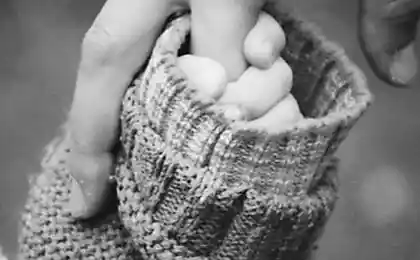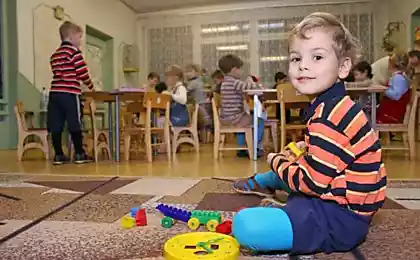605
Do not shout, and then the police arrest you! — We SCARE children
"Don't scream, and then the police arrest you", "I'll give you that my uncle, if thou shalt go" – how often the child hears those words. If he perceives them as an adult? Understanding or fear – what will keep baby from danger? Psychologist Eugene Payson – about whether it is possible to frighten children.
“You listening to me?! Do you understand? I won't take away from the garden, if you're still yelling! And will remain! Do you understand me? Not coming for you! Going to live here! You're disturbing everyone! You poison my life! Will not take home you more!” – shouted the mother of the whole Park, pulling the hand of a crying baby...
– Evgeny, what is the behavior of the child will lead his life?
– In the relations of parents with children must act in two basic principles. First: not to lie. And second: try to understand that feels and thinks the child. When mom tells the child "I'm not going to take" it with your hands breaks the trust of the child to the world, breaks the Foundation that allows him to feel good, confident, calm. The stronger this Foundation is shaken, the more the child will cry in kindergarten. It will be not so much entertainment, how much worry – not leaving him? Will not forget?

Imagine that every day, going to bed, you will not be sure what exactly wakes up. Closing my eyes, I can Wake up in the morning or not?What will happen? Insomnia, malaise, nervous breakdowns. Now imagine that same uncertainty all day, from eight in the morning until five in the evening, experiencing your child. Children used to believe the parents. If mom says "I'm not going to take" it is likely to do so. All of these nine hours in the garden, the child will worry and worry as we would be worried all night not knowing whether we Wake up in the morning.
Don't threaten what you don't want to do. Honesty should be the basis, the cornerstone of the relationship of parents with children.
– What if we witnessed such a scene? To talk to my mom?
– Mom breaks his bad temper and his inability to negotiate with a child who can't answer. And this raises not on the position of the adult, and the position of the other child. "I want to say, that's my son!" (or "my daughter"). If a comment will make the other parents, Mama and I will answer as a teenager: "why are you telling me? And you tell me?" If this happens in the garden, then it is time to intervene counselor, or psychologist, because my mother breaks the whole process of child's adaptation to kindergarten.
– What would be the right thing to say to a child if he misses you and cries?
– We return to first principles: "Speak the truth". "I must go, but I promise that I will come for you as soon as you go for a walk". I promise, "I will come for you in four hours" – an empty phrase, an abstraction, because the kid can't tell time. So give him clear guidelines that are understandable to him "after music lessons" or "when you stand up after quiet hours." And that's a promise we must firmly implement.
Tricking the child that he cried less in the morning and let you go quickly, you lay under the basic trust the child to parents and to the world a real bomb.So I promised to pick up after sleep – have to stand in the door when the kids come out of the bedroom. The child sees that the mother keeps his word – then you can relax and enjoy the day in the garden, not wondering gonna pick you up tonight or forget in the group. If the mother said "I will come back after afternoon snack" – the child knows that he will eat a muffin, drink yogurt and the mother will come.
Is mom a couple of times to deceive the child, and we are back again at the initial stage: the child crying in the morning and not feeling confident. The child's trust requires us to rigid self-discipline and compliance with the agreements. It's not easy, but much harder to know that you're gone and your kid is wondering will I ever see you again sometime.
– What if mom is gone, shouted at the child, said "don't take him out of the garden"?
– Mother is a living person. Can break, mindlessly yelling; not because she's a bad person, but because something went wrong. And often the plans fall through, and we understand that it is not time for the appointed time. But one should always remember that basic trust the child to the world and to the words of parents – the cornerstone of the parent-child relationship.
We all now have mobile phones, including the teachers, all kindergartens have landlines. Call the child and say, "Sorry I'm late, then I will." We're doing so if you agreed to meet with a friend or scheduled a visit to the doctor, and is the perfect time. But when we are waiting for a child, we often think, "well, wait. He understands nothing".
If the mother screams at the child, but understand that doing this is not worth it, it will be correct if the child will hear: "Sorry baby, I lied. In fact, I need you, so I will always come for you."
One or two bad phrases, you can let the relationship with the child down the slope.Once a child forgives us. Our children are good kids. They are willing to forgive, but parents should understand that the word can negate the building of trust that they have built since the birth of the child.
– How to deal with relatives who, wishing the child good, yet admit the phrase "here, give your mother in a children's home if you behave"?
– The first time it's likely to break accidentally. Grandparents very differently educated. Therefore they often think that threats, blackmail, Babayka, monster forest, uncle policeman is a perfect educational tools. Talk to the older generation, convey to them the principles of relationship with the child: not to lie, not to frighten, to negotiate.
If grandparents ignore your request, it is possible to neutralize their words: "we Grandmother believes in fairy tales. But we both know that mom has never and would never send you away". More diplomatic option, "Grandpa joked. Failed. The fact is that you too unfunny joke?"
The same applies to foreign adults: the security guard in the store that says, "You shout, I'll arrest you," the aunt, who is well-intentioned promises to "put in a bag that disobeys". Mother firmly and calmly said to them: "Thank you. We have everything under control." And the child, if he suddenly gets scared, again we say the magic words: "Uncle played a joke."
It is important that the child, first of all, I believe what parents say, but not an outsider. Mom signaled him: "everything is OK. Yes, you're crying, you're tired, I understand, it happens. We have our own way of solving such problems. Yes, it is strange to outsiders to see this. You'd be very surprised if they'd have seen". Teach your child that not every sentence of a stranger he must respond.
– Of course, mom will take the child from kindergarten but how to be with these dangers? Is it worth explaining to the child that can't go on the street with strangers, to describe the real situation – "you can do bad things, you can even kill"?
– Let's not assume children may lilies that are suddenly in 7-8 years, learned about the horrors of the world. We read them stories about the Gingerbread man, little Red riding Hood... little Red riding Hood spoke with a strange wolf, and how it could have ended if not for hunters? The gingerbread man ran away from her grandparents, and how it ended for the Bun? And we are talking 3-5 year old child. Then he learns how to behave in crowded places, not to be lost, why do you need to hold mommy's hand and run to the store, etc.
Already in seven to nine years, they can speak directly: Yes, there are bad people, they're a steal, they have their own goals, you can never us never see, but you can protect yourself by following the safety rules.
We're talking to a child: "don't play on the windowsill and don't open the window because you'll fall and die." We say: "don't stick your fingers in the socket, the current will hit." We say: "don't touch the iron – you can seriously burn yourself". Unfortunately, there are people, which for a child is as dangerous as playing on the roadway.

– Is there some facet in order not to turn caution into a phobia?
– Not be intimidated. Not to invent stories about "But one girl was taken away and then...", "But one boy took uncle..." to draw an analogy with the rules of safety which we have with the child were not to go into the river or the sea without an adult, not to cross the road, not play on the sill of an open window. We build on that and not paint to paint the horrors of what can happen, and talking about safety. We do not describe the child: "If you turn a kettle of boiling water, you scald, bubbles, peel off shreds of skin, we're taking you to the hospital, the doctors will be there to bandage, it will be terrible and painful."
We just teach the child not to touch hot.It is possible the child to be a bully, so he to the kettle did not fit ever. We're not talking about what can be, and how to avoid it. It is important that the child feel master of the situation, felt that he – not limp doll, from him much depends.
– Explain the dangers of burns sometimes suggest the method of "let them once touch the pan, do not want"...
– We don't need to scald a child with boiling water or poke his fingers in the socket, so he understood what a burn or electric shock. Do not have to teach 2-3-year-old child not to poke your fingers into the socket, it is necessary to close the outlet plugs, do not leave a hot Cup on the table, and to take her to where the child will not get. Strictly to watch that, even if it is difficult to force yourself.
Is it possible to tell a child what to do if mom became ill on the street/fire/grandmother fainted?
– The child must know whom to approach, if the mother fell in the street. What if the house is on fire or smoke and there are no adults or adult bad. Need to lose such a situation, the child clearly knew the procedures, knew where to call and who to contact. Let the child will always be a phone list of adults (relatives, family friends, neighbors) that can assign responsibility in a difficult situation – with the weight of that responsibility the child can not cope.
– Whether to downplay the danger in order to calm the child? For example, he is afraid to go to the dentist, and we say "this is how mosquito bites not hurt?"
– Do not need a child to lie. Tell him: "Yes, it will hurt. But it will pass quickly, and then we'll go eat ice cream" or "Have a little patience, but then we go to read your favorite book." If the child is to deceive, to promise that it will not hurt, he will cry and in pain, and resentment.published
Author: Anna Utkina
P. S. And remember, just changing your mind — together we change the world! ©
Join us in Facebook , Vkontakte, Odnoklassniki
Source: www.pravmir.ru/budesh-plakat-ostaneshsya-v-detskom-sadu-krah-doveriya/
“You listening to me?! Do you understand? I won't take away from the garden, if you're still yelling! And will remain! Do you understand me? Not coming for you! Going to live here! You're disturbing everyone! You poison my life! Will not take home you more!” – shouted the mother of the whole Park, pulling the hand of a crying baby...
– Evgeny, what is the behavior of the child will lead his life?
– In the relations of parents with children must act in two basic principles. First: not to lie. And second: try to understand that feels and thinks the child. When mom tells the child "I'm not going to take" it with your hands breaks the trust of the child to the world, breaks the Foundation that allows him to feel good, confident, calm. The stronger this Foundation is shaken, the more the child will cry in kindergarten. It will be not so much entertainment, how much worry – not leaving him? Will not forget?

Imagine that every day, going to bed, you will not be sure what exactly wakes up. Closing my eyes, I can Wake up in the morning or not?What will happen? Insomnia, malaise, nervous breakdowns. Now imagine that same uncertainty all day, from eight in the morning until five in the evening, experiencing your child. Children used to believe the parents. If mom says "I'm not going to take" it is likely to do so. All of these nine hours in the garden, the child will worry and worry as we would be worried all night not knowing whether we Wake up in the morning.
Don't threaten what you don't want to do. Honesty should be the basis, the cornerstone of the relationship of parents with children.
– What if we witnessed such a scene? To talk to my mom?
– Mom breaks his bad temper and his inability to negotiate with a child who can't answer. And this raises not on the position of the adult, and the position of the other child. "I want to say, that's my son!" (or "my daughter"). If a comment will make the other parents, Mama and I will answer as a teenager: "why are you telling me? And you tell me?" If this happens in the garden, then it is time to intervene counselor, or psychologist, because my mother breaks the whole process of child's adaptation to kindergarten.
– What would be the right thing to say to a child if he misses you and cries?
– We return to first principles: "Speak the truth". "I must go, but I promise that I will come for you as soon as you go for a walk". I promise, "I will come for you in four hours" – an empty phrase, an abstraction, because the kid can't tell time. So give him clear guidelines that are understandable to him "after music lessons" or "when you stand up after quiet hours." And that's a promise we must firmly implement.
Tricking the child that he cried less in the morning and let you go quickly, you lay under the basic trust the child to parents and to the world a real bomb.So I promised to pick up after sleep – have to stand in the door when the kids come out of the bedroom. The child sees that the mother keeps his word – then you can relax and enjoy the day in the garden, not wondering gonna pick you up tonight or forget in the group. If the mother said "I will come back after afternoon snack" – the child knows that he will eat a muffin, drink yogurt and the mother will come.
Is mom a couple of times to deceive the child, and we are back again at the initial stage: the child crying in the morning and not feeling confident. The child's trust requires us to rigid self-discipline and compliance with the agreements. It's not easy, but much harder to know that you're gone and your kid is wondering will I ever see you again sometime.
– What if mom is gone, shouted at the child, said "don't take him out of the garden"?
– Mother is a living person. Can break, mindlessly yelling; not because she's a bad person, but because something went wrong. And often the plans fall through, and we understand that it is not time for the appointed time. But one should always remember that basic trust the child to the world and to the words of parents – the cornerstone of the parent-child relationship.
We all now have mobile phones, including the teachers, all kindergartens have landlines. Call the child and say, "Sorry I'm late, then I will." We're doing so if you agreed to meet with a friend or scheduled a visit to the doctor, and is the perfect time. But when we are waiting for a child, we often think, "well, wait. He understands nothing".
If the mother screams at the child, but understand that doing this is not worth it, it will be correct if the child will hear: "Sorry baby, I lied. In fact, I need you, so I will always come for you."
One or two bad phrases, you can let the relationship with the child down the slope.Once a child forgives us. Our children are good kids. They are willing to forgive, but parents should understand that the word can negate the building of trust that they have built since the birth of the child.
– How to deal with relatives who, wishing the child good, yet admit the phrase "here, give your mother in a children's home if you behave"?
– The first time it's likely to break accidentally. Grandparents very differently educated. Therefore they often think that threats, blackmail, Babayka, monster forest, uncle policeman is a perfect educational tools. Talk to the older generation, convey to them the principles of relationship with the child: not to lie, not to frighten, to negotiate.
If grandparents ignore your request, it is possible to neutralize their words: "we Grandmother believes in fairy tales. But we both know that mom has never and would never send you away". More diplomatic option, "Grandpa joked. Failed. The fact is that you too unfunny joke?"
The same applies to foreign adults: the security guard in the store that says, "You shout, I'll arrest you," the aunt, who is well-intentioned promises to "put in a bag that disobeys". Mother firmly and calmly said to them: "Thank you. We have everything under control." And the child, if he suddenly gets scared, again we say the magic words: "Uncle played a joke."
It is important that the child, first of all, I believe what parents say, but not an outsider. Mom signaled him: "everything is OK. Yes, you're crying, you're tired, I understand, it happens. We have our own way of solving such problems. Yes, it is strange to outsiders to see this. You'd be very surprised if they'd have seen". Teach your child that not every sentence of a stranger he must respond.
– Of course, mom will take the child from kindergarten but how to be with these dangers? Is it worth explaining to the child that can't go on the street with strangers, to describe the real situation – "you can do bad things, you can even kill"?
– Let's not assume children may lilies that are suddenly in 7-8 years, learned about the horrors of the world. We read them stories about the Gingerbread man, little Red riding Hood... little Red riding Hood spoke with a strange wolf, and how it could have ended if not for hunters? The gingerbread man ran away from her grandparents, and how it ended for the Bun? And we are talking 3-5 year old child. Then he learns how to behave in crowded places, not to be lost, why do you need to hold mommy's hand and run to the store, etc.
Already in seven to nine years, they can speak directly: Yes, there are bad people, they're a steal, they have their own goals, you can never us never see, but you can protect yourself by following the safety rules.
We're talking to a child: "don't play on the windowsill and don't open the window because you'll fall and die." We say: "don't stick your fingers in the socket, the current will hit." We say: "don't touch the iron – you can seriously burn yourself". Unfortunately, there are people, which for a child is as dangerous as playing on the roadway.

– Is there some facet in order not to turn caution into a phobia?
– Not be intimidated. Not to invent stories about "But one girl was taken away and then...", "But one boy took uncle..." to draw an analogy with the rules of safety which we have with the child were not to go into the river or the sea without an adult, not to cross the road, not play on the sill of an open window. We build on that and not paint to paint the horrors of what can happen, and talking about safety. We do not describe the child: "If you turn a kettle of boiling water, you scald, bubbles, peel off shreds of skin, we're taking you to the hospital, the doctors will be there to bandage, it will be terrible and painful."
We just teach the child not to touch hot.It is possible the child to be a bully, so he to the kettle did not fit ever. We're not talking about what can be, and how to avoid it. It is important that the child feel master of the situation, felt that he – not limp doll, from him much depends.
– Explain the dangers of burns sometimes suggest the method of "let them once touch the pan, do not want"...
– We don't need to scald a child with boiling water or poke his fingers in the socket, so he understood what a burn or electric shock. Do not have to teach 2-3-year-old child not to poke your fingers into the socket, it is necessary to close the outlet plugs, do not leave a hot Cup on the table, and to take her to where the child will not get. Strictly to watch that, even if it is difficult to force yourself.
Is it possible to tell a child what to do if mom became ill on the street/fire/grandmother fainted?
– The child must know whom to approach, if the mother fell in the street. What if the house is on fire or smoke and there are no adults or adult bad. Need to lose such a situation, the child clearly knew the procedures, knew where to call and who to contact. Let the child will always be a phone list of adults (relatives, family friends, neighbors) that can assign responsibility in a difficult situation – with the weight of that responsibility the child can not cope.
– Whether to downplay the danger in order to calm the child? For example, he is afraid to go to the dentist, and we say "this is how mosquito bites not hurt?"
– Do not need a child to lie. Tell him: "Yes, it will hurt. But it will pass quickly, and then we'll go eat ice cream" or "Have a little patience, but then we go to read your favorite book." If the child is to deceive, to promise that it will not hurt, he will cry and in pain, and resentment.published
Author: Anna Utkina
P. S. And remember, just changing your mind — together we change the world! ©
Join us in Facebook , Vkontakte, Odnoklassniki
Source: www.pravmir.ru/budesh-plakat-ostaneshsya-v-detskom-sadu-krah-doveriya/























